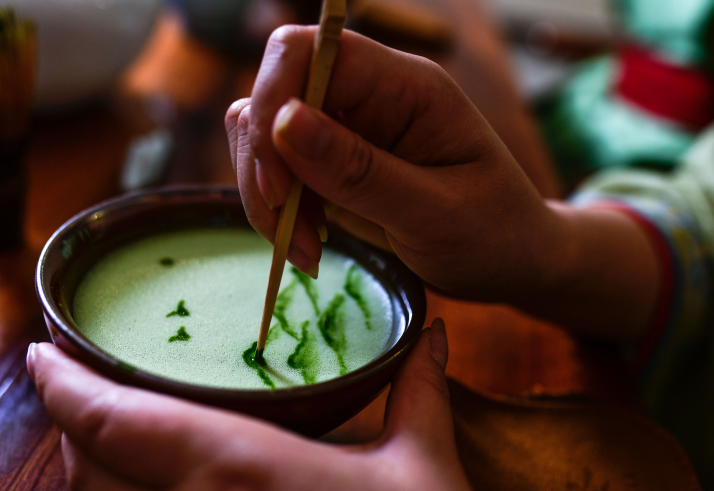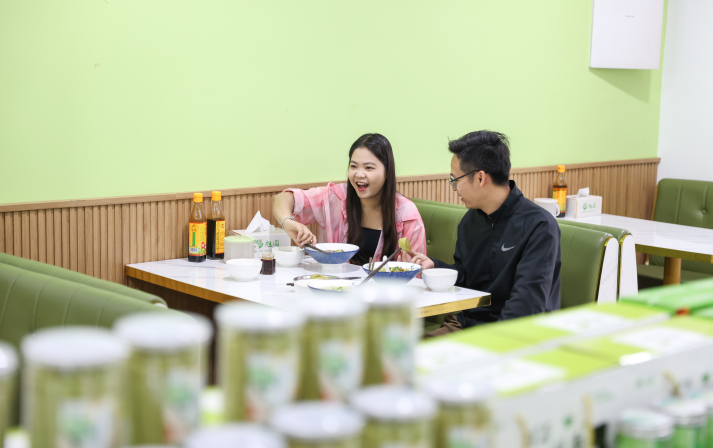| China |
| Matcha mania | |
|
|
 A tea artist prepares a matcha tea drink in a tea room in Jiangkou County, Guizhou Province, on May 14 (XINHUA)
In an era increasingly focused on health and wellness, matcha's refreshing, subtly bitter flavor has propelled it to popularity. It's now a sought-after ingredient across diverse sectors, from beverages to baked goods, ice creams, snacks and restaurant cuisine.
A substantial market exists for matcha, which is powdered green tea traditionally consumed across Northeast Asia. This growing market is being tapped by Jiangkou County in Tongren City, Guizhou Province. In 2024, the county's matcha sales surpassed 1,200 tons, generating a sales revenue of 286 million yuan ($40 million). Its products are now exported to overseas markets including Japan, the United States and France. Chinese matcha is rapidly gaining global prominence. According to the White Paper on the Development of the Matcha Industry, released by the China Center for Information Industry Development, China has become the world's largest matcha producer and consumer. Data from the white paper, released at the 2023 Fanjing Mountain Matcha Conference in Tongren, indicate that in 2020, China's matcha production reached 3,916 tons and consumption reached 3,966 tons, both accounting for over 50 percent of global totals. It's estimated that China's total matcha output will exceed 5,000 tons in 2025. Guizhou's matcha output is expected to represent a quarter of the national total and be exported to over 40 countries and regions.  Customers at a matcha restaurant in Jiangkou on May 14 (XINHUA)
Rapid rise While Tongren has a long history of tea cultivation, it is only in recent years that the city has become recognized as China's matcha capital. Lan Fangqiang, Deputy General Manager of Guizhou Gui Tea Group Co. Ltd. (Gui Tea Group), the largest tea manufacturer in Guizhou, has witnessed the rise of Tongren's matcha industry. Lan told China Newsweek that the domestic tea market has been extremely competitive over the past decade. Although Tongren boasts a long history of tea growing, standing out in the fierce competition posed a significant challenge. "After conducting extensive market research, we discovered that matcha holds immense market potential. Especially after communicating with customers from the U.S., we became even more determined to develop matcha products. We found a substantial market for matcha not only in China but also in the U.S. Furthermore, producing matcha allows us to avoid the highly competitive green tea and black tea sectors," Lan explained. Meng Zude, Chairman of Gui Tea Group, told Farmers' Daily that matcha caters to young people's pursuit of trends. "Many young people lack the time to visit teahouses or slowly brew a cup of tea in the office. But, matcha can be easily added directly to a variety of products for consumption." Furthermore, the matcha industrial chain has extensive potential for expansion. "Whether it's milk, ice cream or biscuits, a touch of matcha can enhance almost anything," Zhang Mingsheng, Director of the Jiangkou County Tea Industry Research Center, told Farmers' Daily. Recognizing the market potential, Gui Tea Group constructed the world's largest matcha workshop in Jiangkou in 2017, capable of producing 4,000 tons of matcha annually. Gui Tea Group selected Jiangkou for its unique natural conditions. Located at the foot of Fanjing Mountain, a UNESCO World Heritage site, Jiangkou is situated at 27 degrees north latitude, characterized by a subtropical monsoon climate. The county experiences an annual frost-free period of nearly 300 days and limited sunshine. These conditions are ideal for the generation and accumulation of nutrients in tea leaves. Moreover, Jiangkou primarily has yellow soil and yellow-brown soil, which are fertile, rich in organic matter and suitable for tea growth. Currently, Gui Tea Group acquires raw materials from 100 vine tea (a type of high-quality green tea that serves as the base material for matcha) processing plants and nearly 100,000 tea farmers. Downstream, it collaborates with milk tea shops, coffee shops and dessert shops across the country, forming a robust matcha industrial chain. "Last year, Gui Tea Group became the world's second largest matcha producer, with Japan's Aiya Matcha ranking first. Our goal is for Gui Tea Group to become the world's largest matcha producer by 2027," Lan said. He added that the company's current buyers include leading brands in diverse sectors like tea drinks, baking and cosmetics. Cultural roots Currently, over 80 percent of Tongren's matcha is sold to businesses as raw material. However, Zhang Yi, CEO of market research firm iiMedia Research, told China Newsweek that while selling matcha as a raw material generates income, there is greater potential to be tapped. Matcha originated in China during the Three Kingdoms and Jin period (220-420) and was then called mocha (powdered tea). Drinking powdered green tea gained popularity in the Tang Dynasty (618-907) and peaked in the Song Dynasty (960-1279). The matcha production process is unique: Fresh green tea is steamed and dried to make tea cakes, which are then ground into fine powder when needed. After Zhu Yuanzhang, founding emperor of the Ming Dynasty (1368-1644), ascended the throne, he ordered the "abolition of compressed tea and the adoption of loose tea," triggering a significant shift in tea production methods. The method of drinking tea also gradually transitioned to brewing loose tea leaves with boiling water, a practice that continues to this day. Matcha was introduced to Japan in the ninth century by Japanese envoys to the Tang Dynasty, where it was further developed and flourished. In the past two decades, Japanese-style matcha products have sparked a craze among young Chinese consumers. Zhang pointed out that while matcha is often associated with Japanese culture, China is its place of origin and offers a wealth of history for brands to explore. Driven by a desire to capture more value, Tongren is leveraging matcha's rich history and cultural significance to fuel its industry's growth. Beyond simply supplying raw materials, the region actively promotes matcha culture through events like matcha festivals, boosting brand recognition and product demand. Significant investments are also driving innovation. Gui Tea Group invested 50 million yuan ($7 million) to establish Guigui Matcha Food Co. Ltd. last year, resulting in a diverse range of value-added products, including matcha cookies and chocolate, injecting new energy into the industry. Further evidence of Tongren's burgeoning matcha scene is the launch of the matcha cold drink brand Moshangji in Jiangkou in 2024. With four stores already established in Tongren, Moshangji's popularity is a testament to the region's focus on quality and creative product development. This holistic approach, combining cultural promotion with product innovation, positions Tongren to capitalize on the growing global demand for matcha and drive sustainable economic development. Copyedited by G.P. Wilson Comments to jijing@cicgamericas.com |
|
||||||||||||||||||||||||||||||
|